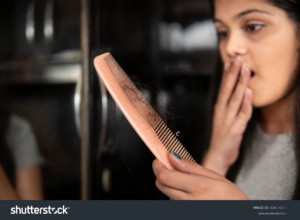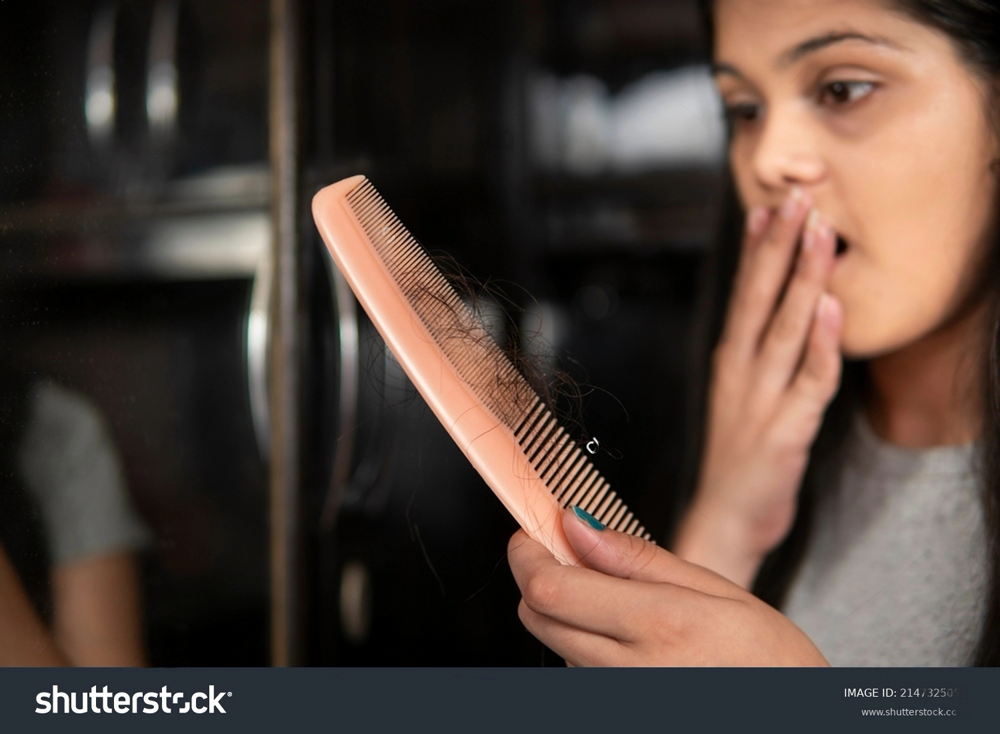Why Is My Hair Falling Out Suddenly?
Are you looking in the mirror and noticing more hair on your brush or pillow than usual? Sudden hair loss can be a distressing experience for men, women, and even kids. But don’t worry—you’re not alone, and there are explanations for why this might be happening. In this comprehensive blog post, we will explore the various reasons why your hair might be falling out suddenly and provide some actionable advice to help you manage and prevent further hair loss.
Understanding Hair Loss

Hair loss, medically known as alopecia, can affect just your scalp or your entire body. It can be temporary or permanent and can result from various factors, including genetics, hormonal changes, medical conditions, and medications. Everyone loses hair naturally as part of the hair cycle, but when you start noticing excessive hair loss, it’s time to dig deeper into the causes.
Common Causes of Sudden Hair Loss
1. Stress and Emotional Trauma
How Stress Affects Hair Growth
Physical or emotional stress can profoundly impact your body, including your hair health. When you experience high levels of stress, your body responds by producing various hormones, including cortisol. Elevated cortisol levels can disrupt the normal hair growth cycle, leading to a condition known as telogen effluvium.
Telogen Effluvium Explained
Telogen effluvium is a temporary form of hair loss that occurs prematurely when many hair follicles enter the resting (telogen) phase. Normally, hair follicles cycle through growth (anagen), transition (catagen), and resting phases. However, this cycle is disrupted under severe stress, causing more hair strands to enter the telogen phase simultaneously and fall out in large quantities.
Types of Stress That Can Cause Hair Loss
- Acute Stress: Events like surgery, severe illness, or a traumatic incident can result in sudden hair loss a few months after the event.
- Chronic Stress: Ongoing stress from work, relationships, or financial difficulties can lead to continuous hair shedding.
- Emotional Trauma: The loss of a loved one, divorce, or other emotional upheavals can trigger hair loss.
Managing Stress-Induced Hair Loss
- Practice Relaxation Techniques: Activities such as yoga, meditation, and deep-breathing exercises can help reduce stress levels.
- Maintain a Healthy Lifestyle: Balanced nutrition, regular exercise, and adequate sleep are crucial for overall well-being and hair health.
- Seek Professional Help: If stress becomes unmanageable, speaking to a therapist or counselor can provide valuable coping strategies
2. Hormonal Changes
Hormonal changes are a significant factor contributing to sudden hair loss, affecting both men and women. Hormones are essential for controlling several body processes, including hair growth. When there are imbalances or fluctuations in these hormones, it can lead to noticeable shedding and thinning of hair. Here are some common hormonal changes that can cause sudden hair loss:
1. Thyroid Issues
Thyroid hormones regulate metabolism and any imbalance—whether hypo- or hyperthyroidism—can affect hair growth. Symptoms like thinning hair or hair loss, weight changes, and fatigue might indicate an underlying thyroid issue.
2. Pregnancy and Postpartum
Elevated hormone levels during pregnancy can actually result in thicker, more luscious hair. However, after childbirth, many women experience sudden and significant hair loss as hormone levels return to their pre-pregnancy states. Postpartum hair loss is the term for this ailment, which usually goes away in a few months.
3. Menopause
Menopause decreases estrogen and progesterone levels, which can lead to hair thinning and increased shedding. The hormonal shift can also make hair feel dryer and more brittle, exacerbating hair loss.
4. Androgenic Alopecia
This is a common form of hair loss in both men and women, often referred to as male or female pattern baldness. It is influenced by the hormone dihydrotestosterone (DHT), a testosterone derivative that causes hair follicles to shrink and produce thinner, shorter hairs.
5. Polycystic Ovary Syndrome (PCOS)
PCOS is a condition characterized by an imbalance of reproductive hormones, often resulting in excess androgen levels. Women with PCOS may experience hair thinning on the scalp and increased body hair.
6. Hormonal Medications
Certain medications, including birth control pills, hormone replacement therapy, and steroids, can affect hormone levels and lead to hair loss. Discontinuing these medications can also result in temporary hair shedding.
Managing Hormonal Hair Loss
Managing hair loss due to hormonal changes involves addressing the underlying hormonal imbalance. Here are some steps that can help:
- Consult a Healthcare Provider: If you suspect hormonal imbalances, seek medical advice for proper diagnosis and treatment.
- Medication: Treatments may include medications to balance hormones, such as thyroid medications, hormone replacement therapy, or anti-androgens.
- Healthy Diet: Besides supporting general health, a diet high in vitamins and minerals helps enhance hair health. Nutrients like iron, biotin, and omega-3 fatty acids are particularly beneficial for hair growth.
- Stress Management: Stress can exacerbate hormonal imbalances. Incorporate stress-reducing activities such as yoga, meditation, or regular exercise into your routine.
- Hair Care: Use gentle hair care products and avoid excessive styling or heat treatments that can damage hair.
By understanding the impact of hormonal changes on hair health and seeking appropriate treatment, you can effectively manage and mitigate sudden hair loss.
3. Nutritional Deficiencies
Sudden hair loss can be alarming, but understanding its root causes can help you take the right steps to address it. One often overlooked factor is nutritional deficiencies. In order to sustain healthy hair development, your body needs a range of vitamins and minerals; the absence of these vital components can result in weaker hair and more shedding. Here are several critical nutrients for healthy hair, along with what happens if you don’t get enough of them.
Key Nutrients for Healthy Hair
1. Iron
Iron produces hemoglobin, which aids in supplying oxygen to hair follicles. Iron deficiency can lead to anemia, which has been directly associated with hair loss. In addition to hair loss, common signs of a lack of iron include tiredness, a pale appearance, and weak nails.
2. Vitamin D
Vitamin D stimulates hair follicles to grow, and deficiencies have been associated with alopecia areata, a condition that causes patchy hair loss. Limited sun exposure, certain health conditions, and an insufficient diet can lead to low levels of Vitamin D.
3. Biotin (Vitamin B7)
The B-vitamin biotin is necessary for synthesizing keratin, the protein that makes up most of your hair’s structure. Although uncommon, a lack of biotin can cause skin rashes, brittle nails, and thinning hair.
4. Zinc
The growth and repair of hair tissue depend on zinc. Additionally, it keeps the oil glands around the hair shafts functioning normally. In addition to other symptoms, including a decreased immune system and poor wound healing, missing zinc can result in hair loss.
5. Protein
Since proteins make up the majority of hair, it is crucial to include them in your diet for healthy hair. Inadequate protein intake can lead to hair shedding, as the body will prioritize protein for vital functions over hair growth.
How to Address Nutritional Deficiencies
Incorporate a Balanced Diet
Ensure your diet includes a variety of foods rich in essential vitamins and minerals:
- Lean meats, fish, and beans are good sources of iron and protein.
- Dairy products, fatty fish, and fortified foods can help increase Vitamin D levels.
- Nuts, seeds, and whole grains are excellent sources of Biotin and Zinc.
Consider Supplements
If dietary changes alone aren’t sufficient, supplements can be an effective way to address specific deficiencies. However, before beginning any new supplement regimen, it is necessary to speak with a healthcare professional.
Stay Hydrated
Proper hydration supports overall health, including hair health. Aim to drink at least 8 glasses of water a day to keep your hair hydrated and strong.
4. Medications and Treatments
Chemotherapy and Radiation Therapy
One of the most well-known causes of sudden hair loss is chemotherapy, a treatment commonly used to combat cancer. The drugs used in chemotherapy target rapidly dividing cells, including those in hair follicles. This often results in hair thinning or complete hair loss. Hair follicle damage from radiation treatment to the head can also result in hair loss.
Hormonal Treatments
Hormonal treatments, such as hormone replacement therapy (HRT) and certain birth control pills, can disrupt the natural balance of hormones in the body. Hair loss may result from this hormonal imbalance, particularly in those affected by hormone changes.
Acne Medications
Medications containing isotretinoin, commonly prescribed for severe acne, can lead to hair thinning or loss. This powerful medication affects the sebaceous glands and can disrupt the hair growth cycle.
Blood Thinners
Anticoagulants, or blood thinners, such as warfarin and heparin, can cause hair loss as a side effect. These drugs can affect the health of the cells that produce hair and interfere with the regular clotting process.
Antidepressants and Mood Stabilizers
Certain antidepressants and mood stabilizers, including selective serotonin reuptake inhibitors (SSRIs) and lithium, have been linked to hair loss. While not everyone taking these medications will experience this side effect, it is possible.
Beta-Blockers
Beta-blockers, used to manage conditions like hypertension and heart disease, can sometimes cause hair loss. These medicines impact the body’s reaction to stress and, occasionally, the normal operation of hair follicles.
Anti-Seizure Medications
Drugs used to control epilepsy and seizures, such as valproate and carbamazepine, may lead to hair loss. These medicines may disrupt the hair development cycle, causing hair thinning or loss.
Immunosuppressants
Medications that suppress the immune system, often prescribed for autoimmune diseases or to prevent organ transplant rejection, can cause hair loss. These medications may interfere with the healthy operation of hair follicles, resulting in hair loss or thinning.
5. Autoimmune Diseases
Sudden hair loss can be alarming and distressing. While there are various reasons behind unexpected hair shedding, autoimmune diseases rank among the significant causes.
Understanding Autoimmune Diseases
Autoimmune diseases occur when the body’s immune system mistakenly attacks its own tissues. Under normal circumstances, the immune system defends the body against infections and diseases. However, this protective mechanism malfunctions in individuals with autoimmune disorders, leading to the immune system targeting healthy cells, including hair follicles.
How Autoimmune Diseases Cause Hair Loss
Autoimmune-related hair loss often happens because the immune system perceives hair follicles as foreign invaders. The body’s defense mechanism attacks these follicles, causing inflammation and ultimately leading to hair shedding. This hair loss can be patchy or widespread depending on the specific autoimmune condition.
Common Autoimmune Diseases Associated with Hair Loss
1. Alopecia Areata
Alopecia areata is a prevalent autoimmune disorder characterized by sudden, patchy hair loss. Hair loss on the scalp and other parts of the body appears as tiny, circular patches due to the body’s immune system targeting hair follicles. Although the precise reason is yet unknown, genes, as well as the environment, are thought to be involved.
2. Lupus
Skin and hair are among the body components that can be impacted by a form of chronic systemic illness. Individuals with lupus may experience scarring alopecia, where inflammation leads to permanent hair loss in areas where the skin is affected. Non-scarring hair loss can also occur during lupus flare-ups.
3. Hashimoto’s Thyroiditis
Hashimoto’s thyroiditis is an autoimmune thyroid disorder that can lead to hair loss. In this condition, the immune system attacks the thyroid gland, causing hypothyroidism (underactive thyroid). Hair thinning and heavy loss might result from an underactive thyroid, which may cause issues with the hair development cycle.
Symptoms to Watch For
If you suspect that your hair loss might be related to an autoimmune disorder, look out for the following symptoms:
- Sudden, patchy hair loss
- Bald spots on the scalp or other areas of the body
- Thinning hair
- Changes in the texture of the scalp or skin
- Other systemic symptoms, such as fatigue, joint pain, or unexplained weight changes
Seeking Medical Advice
Experiencing sudden hair loss can be a sign of an underlying health condition. If you notice any of the above symptoms, it’s essential to consult a healthcare professional or dermatologist. They can conduct an in-depth investigation, which may involve scalp cuttings and blood testing, to identify the underlying reason and suggest suitable therapies.
Treatment Options
Treating hair loss caused by autoimmune diseases often involves addressing the underlying autoimmune condition. Treatment choices could vary based on the particular illness and could include:
- Corticosteroids: Anti-inflammatory medications to suppress the immune response
- Topical Immunotherapy: Application of chemicals to provoke an allergic reaction and stimulate hair growth
- Minoxidil: A topical medication that can help promote hair growth
- Immunosuppressive Agents: Medications that suppress the immune system to reduce inflammation and prevent further hair loss
- Hormone Replacement Therapy: For conditions like Hashimoto’s thyroiditis, thyroid hormone replacement may help restore normal hair growth
6. Infections and Illnesses
1. Infections
Certain infections can lead to hair loss, either through direct impact on hair follicles or as a secondary effect of the infection.
a. Fungal Infections
- Tinea Capitis (Scalp Ringworm) is a type of fungal infection that affects the scalp. It often results in scaly patches and broken hair. The infection can cause hair to fall out in clumps, leaving bald spots.
b. Bacterial Infections
- Folliculitis: This infection affects hair follicles, causing inflammation and sometimes leading to pustules. Severe or repeated cases can damage the hair follicles, resulting in hair loss.
c. Viral Infections
- Herpes Zoster (Shingles): This viral infection can cause a painful rash and sometimes leads to hair loss in the affected scalp areas.
2. Illnesses
Several systemic illnesses can also trigger hair loss, either as a direct symptom or due to the stress they place on the body.
a. Autoimmune Diseases
- Alopecia Areata: This autoimmune condition causes the immune system to attack hair follicles, leading to patchy hair loss. It can affect the scalp and other body parts.
b. Thyroid Disorders
- Hypothyroidism and Hyperthyroidism: Both underactive and overactive thyroid glands can lead to hair thinning and loss. Unbalances in the thyroid hormone can disturb the hair growth cycle, as the thyroid hormone is vital to hair development.
c. Chronic Illnesses
- Diabetes: Poor blood circulation and immune system impairment associated with diabetes can impact hair follicles, leading to hair loss.
- Lupus: This chronic autoimmune disease can cause hair to fall out in patches, along with other symptoms like fatigue and joint pain.
d. Acute Illnesses
- High Fever and Severe Infections: Conditions that cause a high fever or severe infections can shock the hair cycle, pushing more hairs than usual into the shedding phase. This condition is known as telogen effluvium.
7. Genetic Factors
Millions of individuals worldwide suffer from hair loss, and while there are several causes, heredity is a major one. Learning about the natural factors will help you better understand why hair loss happens and possible preventative measures.
Here are the seven genetic factors that contribute to hair loss:
Family History
One of the most significant indicators of hair loss is family history. If your parents or grandparents experienced hair loss, there’s a high likelihood you might, too. This hereditary pattern is often referred to as androgenetic alopecia and affects both men and women.
Hormonal Changes
Hormones play a crucial role in hair growth and loss. Specifically, dihydrotestosterone (DHT), a derivative of testosterone, is known to shrink hair follicles. Individuals with a genetic predisposition for higher levels of DHT are more likely to experience hair loss.
Gene Variants
Certain gene variants have been linked to hair loss. For instance, variations in the AR gene, which encodes the androgen receptor, can influence how your hair follicles respond to hormones. The presence of specific gene variants can make you more prone to hair thinning and shedding.
Ethnicity
Your genetic background and ethnicity can influence the pattern and extent of hair loss. Due to changes in genetic composition, studies have found that individuals of European culture are more prone than those of Asian or African descent to suffer from androgenetic alopecia.
Genetic Disorders
Certain genetic disorders can lead to hair loss. Conditions such as trichorrhexis nodosa, where hair shafts are prone to breaking, and hypotrichosis, characterized by sparse hair growth, are directly linked to genetic mutations.
Telogen Effluvium
While often triggered by environmental factors like stress or illness, telogen effluvium can also have a genetic component. Individuals with a family history of this condition are more likely to experience sudden and excessive hair shedding.
DNA found in mitochondria
Recent studies show that hair loss may also be caused by the mother passing on mitochondrial DNA. The generation of cellular energy can be impacted by alterations in mitochondrial DNA, which may result in weaker hair follicles and more shedding.
8. Hair Care Practices
Excessive hairstyling, tight hairstyles, chemical treatments, and heat damage can all contribute to hair loss. This is particularly common in people who frequently dye their hair, use hot tools, or wear tight hairstyles like ponytails or braids. Let’s explore how these practices can impact your hair health:
Excessive Hairstyling
Constantly styling your hair can damage its strength and elasticity. Over time, frequent brushing, teasing, or even washing can weaken the hair shaft, making it more prone to breakage and loss.
Tight Hairstyles
Styles that pull tightly on the scalp, such as ponytails, braids, buns, or cornrows, can cause tension and stress on hair follicles. This condition, known as traction alopecia, can lead to hair thinning and permanent loss if not addressed.
Chemical Treatments
Chemical treatments like hair dyes, perms, relaxers, and bleaches can weaken hair structure and cause damage. The harsh chemicals in these products can strip away natural oils, leaving hair brittle and more susceptible to breakage.
Heat Damage
Regularly using hot tools such as hairdryers, straighteners, and curling irons can deplete your hair’s moisture, leading to dryness and breakage. The high temperatures can damage the hair cuticle, making it less able to retain moisture and more prone to splitting.
Preventive Tips
- Limit the use of hot tools and always use a heat protectant spray.
- Opt for looser hairstyles that don’t put too much stress on the hair follicles.
- Minimize chemical treatments and seek professional advice for safer alternatives.
- Use gentle hair care products that nourish and protect your hair.
By choosing wisely throughout your hair care regimen, you can ensure that your locks stay strong and healthy by being aware of these major reasons for hair loss.
9. Weight Loss
Losing weight may be a fulfilling experience that offers several health advantages and a sense of success. However, it sometimes comes with unexpected side effects, and hair loss is one such concern. Let’s examine the relationship between weight loss and hair loss and discuss ways to address this problem.
The Link Between Weight Loss and Hair Loss
Nutritional Deficiencies
One of the primary reasons for hair loss during weight loss is nutritional deficiency. When you cut calories significantly or follow restrictive diets, your body may not get enough essential nutrients like vitamins and minerals crucial for healthy hair growth.
Stress and Hormonal Changes
Rapid weight loss can also induce physical stress, leading to hormonal imbalances. Increased shedding may result from this stress, forcing hair follicles into the resting phase of the hair development cycle.
Caloric Restriction and Hair Follicle Health
Extreme caloric restriction can slow down bodily functions, including hair growth. Hair follicles are highly sensitive to changes in energy availability, and a sharp decline in calorie intake can cause follicles to become dormant.
Preventing Hair Loss During Weight Loss
Balanced Diet
Ensure that your diet includes a variety of nutrient-rich foods. Focus on incorporating:
- Proteins: Essential for hair structure. Include lean meats, fish, eggs, and legumes.
- Vitamins: Particularly Vitamin A, C, D, and E. Consume plenty of fruits, vegetables, and fortified foods.
- Minerals: Iron and zinc are crucial for hair health. Include leafy greens, nuts, and seeds.
Gradual Weight Loss
Aim for a gradual weight loss of 1-2 pounds per week. This will allow your body to adapt without putting you under a lot of stress or leaving you hungry.
Supplements
If your diet lacks certain nutrients, consider taking supplements. Biotin, iron, and omega-3 fatty acids have been shown to promote healthy hair.
Stress Management
Incorporate stress-reducing activities, such as yoga, meditation, or regular exercise, into your routine. Controlling stress helps lessen hair loss and helps regulate hormones.
Consulting a Professional
If you experience significant hair loss during your weight loss journey, it might be beneficial to consult a healthcare professional. In between offering advice on a balanced diet and other preventative measures, they can help determine whether there are any deeper causes.
10. Age
Hair loss is a common problem that affects millions of individuals globally. While various factors can contribute to hair thinning and balding, age is one of the most significant contributors.
What is Age-Related Hair Loss?
Age-related hair loss, often referred to as androgenetic alopecia or senile alopecia, occurs as a natural part of the aging process. Both men and women may experience this kind of hair loss, although the patterns and severity can differ between genders.
Why Does Hair Thin with Age?
Several factors contribute to hair loss as we age:
- Hormonal Changes:
-
- Men often experience male pattern baldness, which is linked to a hormone called dihydrotestosterone (DHT). DHT can cause hair follicles to contract, resulting in thinning locks and, finally, hair loss.
- Women may undergo hormonal changes associated with menopause, resulting in a condition known as female pattern baldness. This can cause hair thinning, particularly on the scalp’s top and crown.
- Reduced Hair Follicle Renewal:
- Hair follicles have a life cycle of growth, rest, and shedding phases. With age, the rate at which new hair grows slows down, and the follicles produce thinner, weaker strands.
- Decreased Blood Flow:
- Blood flow to the scalp decreases with age, reducing the supply of essential nutrients and oxygen that hair follicles need for healthy growth.
- Nutritional Deficiencies:
- Aging can affect how well our bodies absorb nutrients. Deficiencies in key vitamins and minerals like iron, vitamin D, and B vitamins can impact hair health.
- Genetics:
- Family history plays a crucial role in age-related hair loss. If you have relatives who have experienced significant hair thinning or balding, you might also be more prone to it.
Managing Age-Related Hair Loss
Although age-related hair loss is natural, several strategies can help manage and potentially slow the process:
- Healthy Diet:
- Ensure your diet is rich in vitamins and minerals supporting hair health. Foods with omega-3 fatty acids, iron, and biotin can be particularly beneficial.
- Topical Treatments:
- Over-the-counter treatments like Minoxidil can help stimulate hair growth in some people. Prescription medications such as Finasteride are also available but are typically prescribed for men.
- Hair Care Routine:
- Use gentle hair care products and avoid excessive heat styling or harsh chemical treatments that can damage hair.
- Medical Consultation:
- Consult with a dermatologist or a trichologist for personalized treatment options. They may recommend platelet-rich plasma (PRP) injections or laser therapy.
- Hair Transplants:
- Hair transplant surgery can effectively restore hair density for those seeking more permanent solutions.
Identifying the Cause of Your Hair Loss
Understanding the root cause of your sudden hair loss is the first step toward finding a solution. Here are some steps you can take:
- Consult a Healthcare Professional: Visit a doctor or dermatologist to discuss your symptoms and possible causes. They may perform blood tests or scalp biopsies to determine the cause.
- Review Your Medical History: Consider any recent changes in your health, medications, or lifestyle that could contribute to hair loss.
- Evaluate Your Diet: Assess your nutritional intake and consult a nutritionist to ensure you get the necessary vitamins and minerals.
- Manage Stress: Implement stress-reducing activities such as yoga, meditation, or exercise to help manage emotional and physical stress.
- Examine Your Hair Care Routine: Look at your hair care practices and adjust to reduce damage.
Treatment Options for Hair Loss
Once you understand the cause, you can explore various treatment options:
1. Medical Treatments
- Minoxidil (Rogaine): An over-the-counter topical treatment approved for hair growth.
- Finasteride (Propecia): A prescription medication for male-pattern baldness.
- Corticosteroids: Used to treat alopecia areata and other inflammatory conditions.
- Platelet-rich plasma shock (PRP) Therapy: A treatment that uses your own blood’s growth factors to stimulate hair growth.
2. Nutritional Supplements
- Iron Supplements: If you have an iron deficiency, supplementation can help.
- Biotin: Known to support hair and nail health.
- Multivitamins: Ensure you have a balanced intake of essential vitamins and minerals.
3. Lifestyle Changes
- Balanced Diet: Incorporate a variety of fruits, vegetables, lean proteins, and whole grains.
- Hydration: Drink plenty of water to keep your hair and scalp hydrated.
- Regular Exercise: Boosts overall health and reduces stress.
4. Hair Care Practices
- Gentle Hair Care: Use sulfate-free shampoos and conditioners, avoid excessive heat styling, and be gentle when brushing.
- Protective Hairstyles: Avoid tight hairstyles that can pull on the hair.
5. Alternative Therapies
- Essential Oils: Some people find that oils like rosemary, peppermint, and lavender can promote hair growth.
- Acupuncture: This may help reduce stress and improve circulation to the scalp.
When to Seek Professional Help
If your hair loss is sudden, severe, or accompanied by other symptoms such as pain, itching, or redness, it’s important to seek professional medical advice. A healthcare provider can provide a proper diagnosis and recommend the best course of treatment for your specific situation.
Conclusion
Sudden hair loss can be a source of significant distress, but understanding the potential causes and taking proactive steps can help you manage and mitigate further hair fall. Effective hair loss management might involve changing your diet, controlling your stress levels, or getting medical attention.
Your hair reflects your overall health. By caring for your body and mind, you can contribute to keeping your hair strong and healthy. If you’re experiencing hair loss and need specific guidance, make an appointment with a healthcare provider as soon as possible. They may offer solutions that suit your needs and can help you restore your hair and your confidence.






